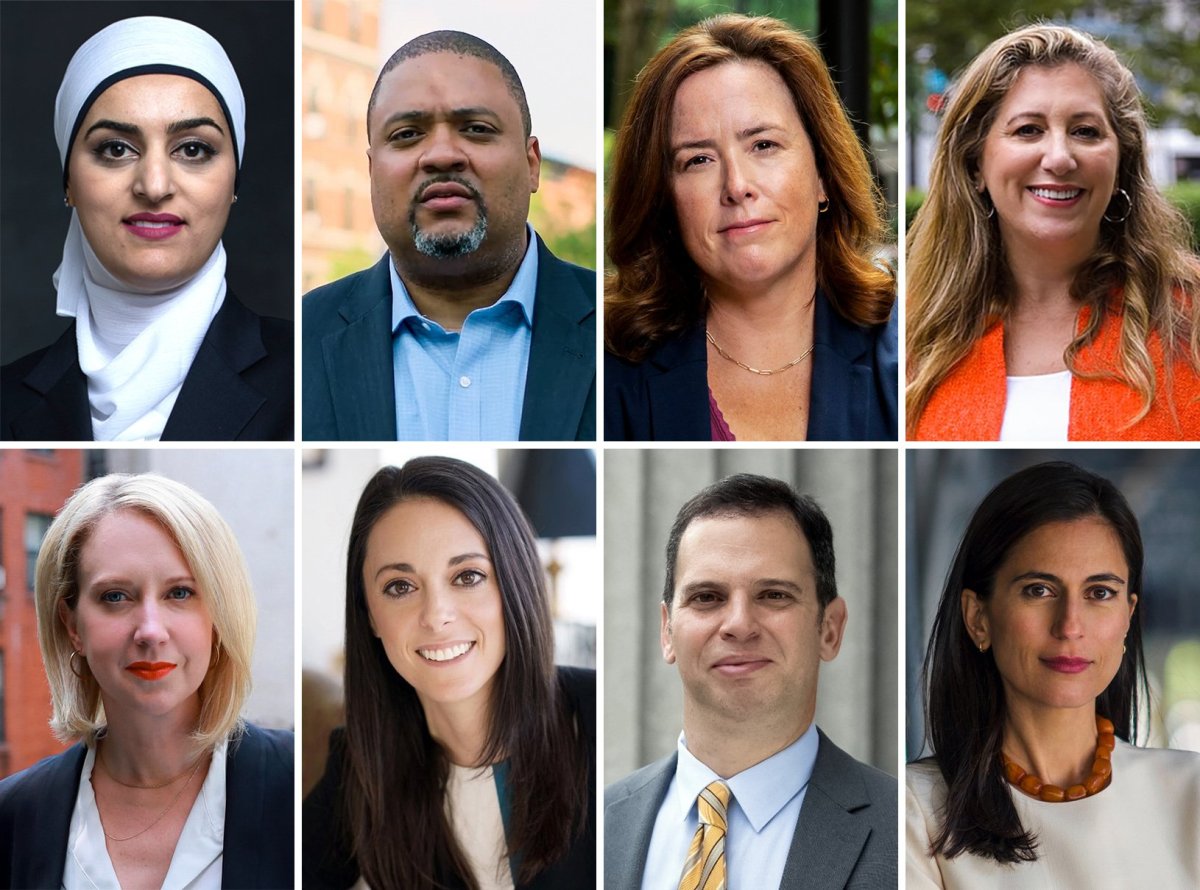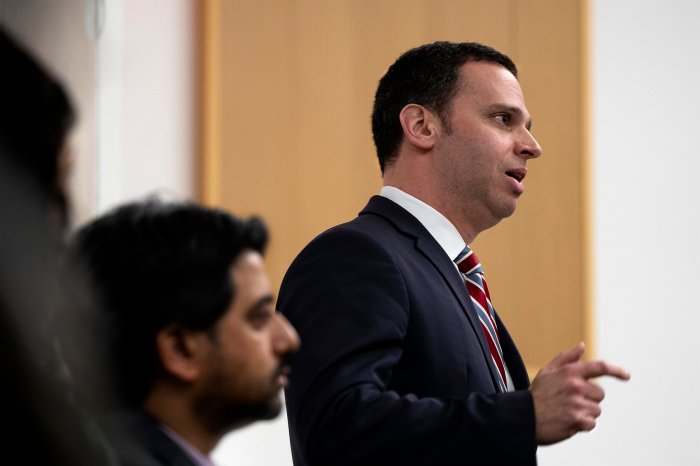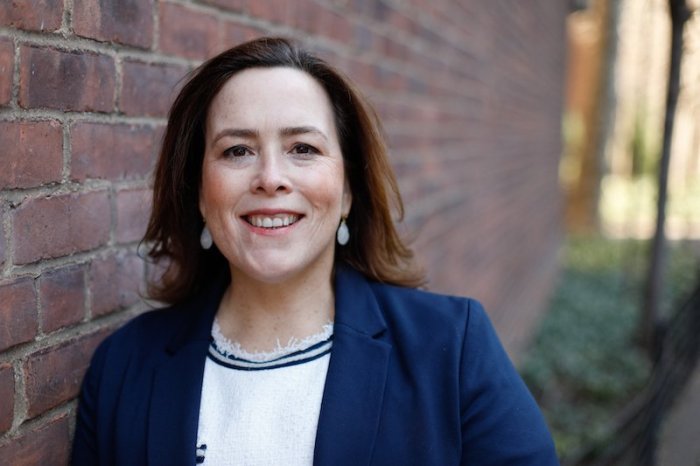Eight candidates for Manhattan District Attorney met through Zoom on Tuesday night for a virtual candidate forum, with the borough’s DA election just over six months away. Professor Brett Dignam, Vice Dean at Columbia Law School, moderated the forum, which was hosted by West Side Democrats, Broadway Democrats, and Uptown Community Democrats.
The candidates in the forum were Tahani Aboushi, Alvin Bragg, Liz Crotty, Diana Florence, Lucy Lang, Eliza Orlins, Dan Quart, and Tali Farhadian Weinstein. All eight candidates are affiliated Democrats.
Tuesday night’s forum began with three-minute introductions from each candidate. Most candidates touched on the need to restore trust to the District Attorney’s office as they laid out their resumes for the public.
The candidates were first asked about how they would focus on funding Alternatives to Incarceration (ATI) programs. Aboushi expressed a mission to “shrink the footprint of this office,” an idea that resonated across most of the candidates, who said they wanted to make incarceration a last resort.
“The DA has an ATI program,” said Aboushi. “It’s not integrated.”
Crotty asserted that there is a reality that “not everyone wants an ATI, that actions have consequences, and not everybody works for it.” Across the forum, Crotty separated herself from the other candidates on the issue of decarceration.
Many candidates—namely Orlins, Bragg, Florence, and Aboushi—agreed that the conditions of prison itself make successful integration back into society difficult. However, most candidates contended that re-entry and post-incarceration are not traditionally the District Attorney’s work.
Orlins attacked a current policy of the DA’s office, which automatically sends a “form letter” to every incarcerated person that recommends against early release. She talked about eliminating these practices, which she called New York’s own “family separation policy”. Meanwhile, Florence suggested increased programs with schools and nonprofits for incarcerated people before they get released.
The candidates all had experience to tout when asked about their managerial qualifications for the role. Lang has worked “with offices twice the size of the Manhattan DA” as Director of the Institute for Innovation in Prosecution. Bragg has run a government division of 100 lawyers, and oversaw an office of more than 1200 personnel as Chief Deputy Attorney General in New York State. Weisntein served as General Counsel of the Brooklyn District Attorney’s office, where she managed 500 Assistant District Attorneys.
Orlins, Quart, and Crotty, however, are running on slightly different backgrounds. Orlins prides herself on being the only public defender in the race, and took a hard stance on prosecution as a practice as “cruel, inhumane, and plainly wrong.” Crotty has managed a private law practice for thirteen years. Quart, as an Assemblymember for District 73, claimed that he was the only one who already has a record of having to answer to public pressure and not swaying on his views.
The candidates were also asked about the role of advocacy in the DA’s office, and how allegations of misconduct by the police would be handled. Lang put forth building up tracking systems for officers who “cannot be relied on,” and Aboushi and Orlins called for zero-tolerance policies towards police misconduct, as well as increased public participation.
Bragg, who is from Harlem, is representing Eric Garner’s family as they sue the City. He said that holding police accountable is a “top priority” for him, and that he has the body of work to show it.
The candidates were asked about what crimes they would prioritize. Weinstein pointed to the fact that shootings have doubled and murders are up nearly 40 percent this year, and said she has a 10-point plan for gun crimes. Florence, Aboushi, and Bragg all spoke on the need to curb gun violence at its root, highlighting gun violence as the symptom of a larger problem.
For Florence, that means tackling the link between violent crime and corruption: “That means going after wage theft, and landlords that cheat. We need to go after employers that kill.”
Orlins and Quart said they would focus primarily on de-prioritizing drug felonies and getting rid of mandatory minimums for drug sentencings.
Crotty diverged from the other candidates in suggesting that the NYPD’s controversial Anti-Crime Unit be put back on the street, though the Unit’s problematic nature was recognized, particularly in relation to the Stop & Frisk program, which was ultimately ruled unconstitutional. Crotty said that “if people are caught with a gun, they need to know that they are going to go to jail.”
Asked about handling complaints from vulnerable population members who feel mistreated or distrustful of the system, Bragg, Orlins, and Lang called for more going in the field, to people where they feel comfortable, as well as establishing sites that are not the DA’s office for people to go to if they want to file a complaint.
Quart, alongside Orlins, noted that “witness buy-in or cooperation can’t be expected” under the current system of widespread profiling and prejudice, and that that won’t change without deep structural shifts. Orlins and Weinstein also passionately singled out ICE and called for its elimination in NYC.
Following those statements were resounding claims that no Manhattan DA candidate will be giving preferential treatment to high-profile and well-connected defendants.
In closing statements, Orlins urged people to “finally acknowledge what the harms of this system have really meant,” and referenced the 3,000 people she has defended as a public defender. Florence made claim to her combination of management experience, practical experience, and vision.
Bragg touched on each issue discussed throughout the forum and explained a personal connection to them. “I know the system firsthand, and I’m ready.”
Lang mentioned that she would plan to include public defenders on her transition team, so as to operationalize what changes need to be made in the District Attorney’s office. Aboushi emphasized her position as “that something different” required to transform the office, and bring trust back into it.
A representative from West Side Democrats thanked the candidates for participating and reminded everyone to vote this year. The Manhattan District Attorney primary election will be held on June 22.












![Manhattan DA Candidate Lucy Lang [Photo provided by Jason Novak]](https://politicsny.com/wp-content/uploads/2021/02/A37I884843322-1365x2048-1.jpg?w=700)



